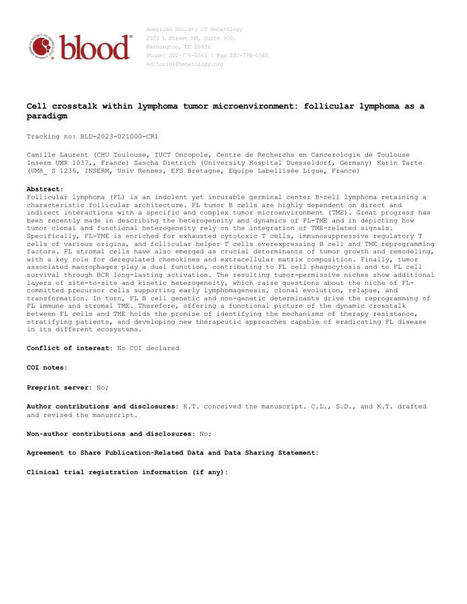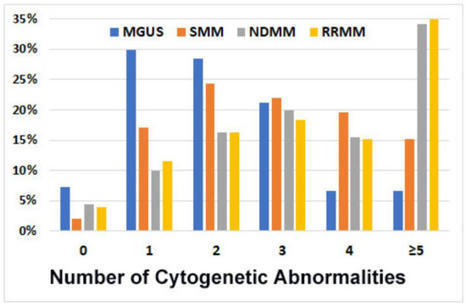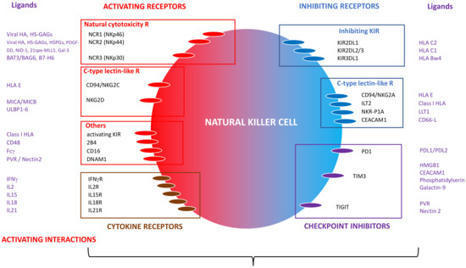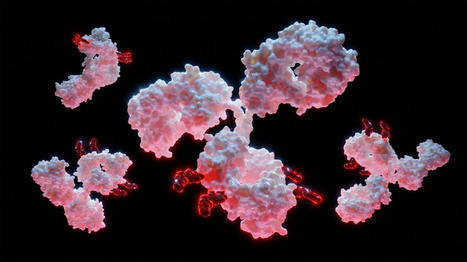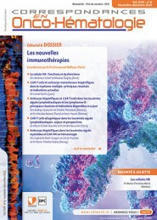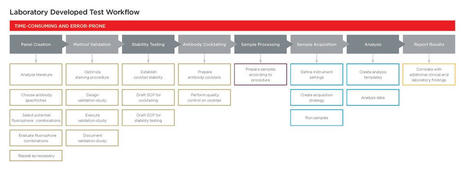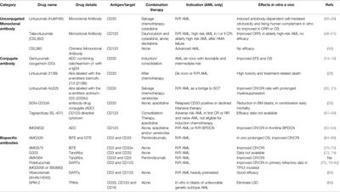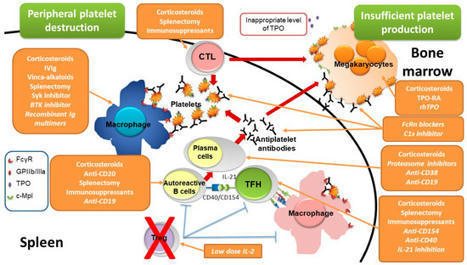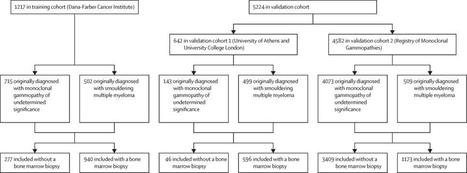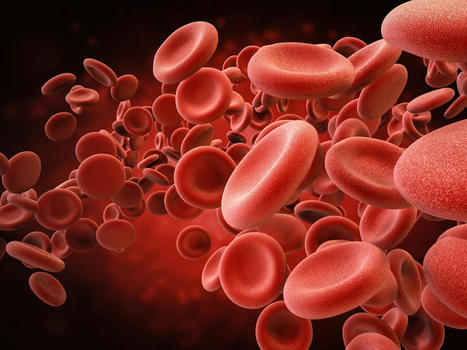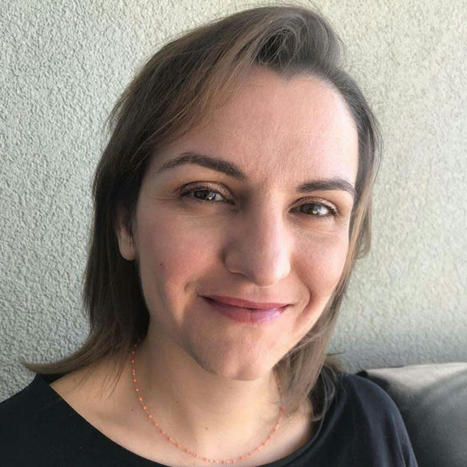 Your new post is loading...
 Your new post is loading...

|
Scooped by
Gilbert C FAURE
December 17, 2023 3:49 AM
|
Follicular lymphoma (FL) is an indolent yet incurable germinal center B-cell lymphoma retaining a characteristic follicular architecture. FL tumor B cells are h

|
Scooped by
Gilbert C FAURE
December 2, 2023 4:33 AM
|
The aim of this study was to examine the cytogenetic profiles of plasma cell neoplasms (PCNs) at various disease stages, encompassing 1087 patients with monoclonal gammopathy of undetermined significance (MGUS), smoldering multiple myeloma (SMM), newly diagnosed multiple myeloma (NDMM), and...

|
Scooped by
Gilbert C FAURE
November 4, 2023 4:24 AM
|
See what's in store for #ASH23! View the abstracts selected now: https://loom.ly/QUv5ZLY
Experience the science in San Diego or virtually. Registration is…

|
Scooped by
Gilbert C FAURE
August 11, 2023 11:29 AM
|

|
Scooped by
Gilbert C FAURE
July 9, 2023 5:16 AM
|
Dysregulation of the innate immune system and inflammatory-related pathways has been implicated in hematopoietic defects in the bone marrow microenvironment and associated with aging, clonal hematopoiesis, myelodysplastic syndromes (MDS), and acute myeloid leukemia (AML).

|
Scooped by
Gilbert C FAURE
June 16, 2023 8:25 AM
|
Myeloma tumor cells are particularly dependent on their microenvironment and sensitive to cellular antitumor immune response, including natural killer (NK) cells. These later are essential innate lymphocytes implicated in the control of viral infections and cancers.

|
Scooped by
Gilbert C FAURE
March 12, 2023 3:01 AM
|

|
Scooped by
Gilbert C FAURE
March 2, 2023 8:24 AM
|
Feline leukemia virus (FeLV) and feline immunodeficiency virus (FIV) are retroviruses affecting cats worldwide, and the prevalence of infection varies considerably according to the geographic area.We retrospectively described FIV- and FeLV-associated diseases in a population of 1470 necropsied cats...

|
Scooped by
Gilbert C FAURE
February 28, 2023 4:49 AM
|
Our study demonstrated the distinct peripheral immune cell profile of DHL patients by contrast to DLBCL patients and healthy people, as well as the heterogeneity within the DHL group, which could provide valuable guidance for the diagnosis and treatment of DHL.

|
Scooped by
Gilbert C FAURE
February 18, 2023 6:52 AM
|
A Member Board of the American Board of Medical Specialties

|
Scooped by
Gilbert C FAURE
February 17, 2023 3:41 AM
|
The ability to eliminate specific pathologic cells is creating more options for multiple myeloma patients. Several targeting approaches are in development.

|
Scooped by
Gilbert C FAURE
February 11, 2023 3:00 AM
|
While the genetic landscape of chronic lymphocytic leukemia (CLL) has been broadly profiled by large-scale sequencing studies performed over the past decade, the molecular basis of the transformation of CLL to aggressive lymphoma, or Richter syndrome (RS), has remained incompletely characterized.

|
Scooped by
Gilbert C FAURE
January 10, 2023 10:47 AM
|
Correspondances en Onco-Hématologie / N° 6 décembre 2022 Correspondances en Onco-Hématologie N° 6 | décembre 2022 Acheter ce numéro → S'abonner → Déjà abonné ? Connectez-vous 1 / 2 >> suivant Tous les articles de cette édition Editorial Immunothérapie en hématologie, une vieille idée toute neuve...
|

|
Scooped by
Gilbert C FAURE
December 9, 2023 2:21 AM
|
The FDA has approved the world’s first medicine based on CRISPR gene-editing technology, a groundbreaking treatment for sickle cell disease.
Hematologic malignancies (blood cancers) are diseases of immune system cells and are traditionally categorized according to where the cancer is first detected.

|
Scooped by
Gilbert C FAURE
October 9, 2023 4:24 AM
|

|
Scooped by
Gilbert C FAURE
July 31, 2023 4:14 AM
|
Harmonization of hematology knowledge is part of EHA’s mission. The first step in harmonizing hematology training is to stipulate the required fields of knowledge, each with its recommended level of competence. For this purpose, EHA published in 2006 th

|
Scooped by
Gilbert C FAURE
July 6, 2023 1:53 PM
|
MECOM deficiency is a recently identified inborn error of immunity and inherited bone marrow failure syndrome caused by haploinsufficiency of the hematopoietic transcription factor MECOM. It is unique among inherited bone marrow failure syndromes, many of which present during later childhood or adol …

|
Scooped by
Gilbert C FAURE
April 8, 2023 5:58 AM
|
Multiple Myeloma (MM) remains a difficult to treat disease mainly due to its biological heterogeneity, of which we are more and more knowledgeable thanks to the development of increasingly sensitive molecular methods that allow us to build better prognostication models.

|
Scooped by
Gilbert C FAURE
March 5, 2023 3:33 AM
|
In the past few years, our improved knowledge of acute myeloid leukemia (AML) pathogenesis has led to the accelerated discovery of new drugs and the development of innovative therapeutic approaches. The role of the immune system in AML development, growth and recurrence has gained increasing interest. A better understanding of immunological escape and systemic tolerance induced by AML blasts has been achieved. The extraordinary successes of immune therapies that harness the power of T cells in solid tumors and certain hematological malignancies have provided new stimuli in this area of research. Accordingly, major efforts have been made to develop immune therapies for the treatment of AML patients. The persistence of leukemia stem cells, representing the most relevant cause of relapse, even after allogeneic stem cell transplant (allo-SCT), remains a major hurdle in the path to cure for AML patients. Several clinical trials with immune-based therapies are currently ongoing in the frontline, relapsed/refractory, post-allo-SCT and minimal residual disease/maintenance setting, with the aim to improve survival of AML patients. This review summarizes the available data with immune-based therapeutic modalities such as monoclonal antibodies (naked and conjugated), T cell engagers, adoptive T-cell therapy, adoptive-NK therapy, checkpoint blockade via PD-1/PD-L1, CTLA4, TIM3 and macrophage checkpoint blockade via the CD47/SIRPa axis, and leukemia vaccines. Combining clinica

|
Scooped by
Gilbert C FAURE
March 2, 2023 7:32 AM
|
Immune thrombocytopenia (ITP) is a rare autoimmune disorder caused by peripheral platelet destruction and inappropriate bone marrow production. The management of ITP is based on the utilization of steroids, intravenous immunoglobulins, rituximab, thrombopoietin receptor agonists (TPO-RAs), immunosuppressants and splenectomy. Recent advances in the understanding of its pathogenesis have opened new fields of therapeutic interventions. The phagocytosis of platelets by splenic macrophages could be inhibited by spleen tyrosine kinase (Syk) or Bruton tyrosine kinase (BTK) inhibitors. The clearance of antiplatelet antibodies could be accelerated by blocking the neonatal Fc receptor (FcRn), while new strategies targeting B cells and/or plasma cells could improve the reduction of pathogenic autoantibodies. The inhibition of the classical complement pathway that participates in platelet destruction also represents a new target. Platelet desialylation has emerged as a new mechanism of platelet destruction in ITP, and the inhibition of neuraminidase could dampen this phenomenon. T cells that support the autoimmune B cell response also represent an interesting target. Beyond the inhibition of the autoimmune response, new TPO-RAs that stimulate platelet production have been developed. The upcoming challenges will be the determination of predictive factors of response to treatments at a patient scale to optimize their management.

|
Scooped by
Gilbert C FAURE
February 28, 2023 4:45 AM
|
Use of the PANGEA models in clinical practice will allow patients with precursor disease
to receive more accurate measures of their risk of progression to multiple myeloma,
thus prompting for more appropriate treatment strategies.

|
Scooped by
Gilbert C FAURE
February 18, 2023 2:30 AM
|
HemaSphere, a premier hematology information resource, publishes results of highly relevant basic, translational and clinical research in hematology.

|
Scooped by
Gilbert C FAURE
February 11, 2023 3:01 AM
|
The National Health Service recently launched a world-first clinical trial that tests the safety of transfusing lab-grown blood cells into patients.

|
Scooped by
Gilbert C FAURE
January 21, 2023 11:20 AM
|
The detection of Minimal Residual Disease (MRD) by flow cytometry: lessons learned from the validation of Multiple Myeloma MRD assay for use in multi-centric clinical trials Flow Cytometry is a complex technology that allows multiparametric measurements on high numbers of single cells from complex mixtures. Given its high-throughput, flow cytometry is a highly sensitive technique that can be used for the detection of very rare cell populations. It is of no surprise that in the clinical field of cytometry, it has become a platform of choice for the detection of minimal residual disease (MRD) in various types of leukemia. The determination of MRD in cancer patients is of great clinical interest as it can be used as a good prognostic indicator of cancer and likelihood to relapse; thus MRD detection is increasingly being proposed as a potential surrogate endpoint for clinical trials. In the recent years, Labcorp Central Laboratory Services has developed and validated highly sensitive flow cytometry assays for MRD detection in Acute Myeloid Leukemia (AML), Chronic Lymphoid Leukemia (CLL) and Multiple Myeloma (MM) for primary/secondary endpoint use in clinical trials. In this presentation, Christèle will review the general use of flow cytometry in MRD detection in clinical trials and will take the audience through the CAP/CLIA validation of Labcorp MM MRD flow cytometry assay.
|

 Your new post is loading...
Your new post is loading...
 Your new post is loading...
Your new post is loading...



